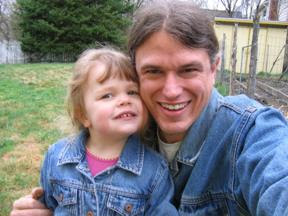I cannot remember a time without Pete Seeger, and I cannot remember a time without the music.I could be three, or four years old, skipping around a living room in a house that I cannot remember, singing "Put your finger in the air, in the air." Or what was then the funniest line I'd ever heard in song: [regarding the color of flowers for the imminently dying Henry] "Green and yeller. GREEEEN and yeller."
I could be six years old, at vacation bible school, singing, "If I had a hammer," which I then thought was a silly song, because if he really wanted a hammer, why didn't he just go get one.
Nine years old, at summer camp.
Fourteen years old, watching him on TV, calling out, "Split wood, not atoms." He looked like an older man to me, then. It was 1979. He was 59.
Eighteen years old, at vacation bible school, leading the kids in singing, "If I had a hammer," which I then thought was a marvelous song. I sang other songs with them to. And sometimes, I sang as I had learned from him, though I did not remember where I had learned it, "join in on the chorus when it comes round."
Twenty years old, at Oberlin College. He came to play. But I was twenty, and full of twenty, and though I wanted to go, something else called me away (I don't even think it was a girl).
I remember thinking later, that Muddy Waters had come to Oberlin, and died that same year. Then Count Bassie came to Oberlin, and died that same year, and I was sure that the curse would hit Pete Seeger next, and I had missed my one chance to see him. It was 1985, he was 65. Most people retire at 65. I was wrong about the curse, but I was right that that had been my last chance.
He came to Oberlin in 1956, too. In 1985 he filled Finney Chapel, the largest venue we had. In 1956 he filled the living room of Johnson House, which was just a living room. He was on McCarthy's black list and in contempt of Congress for not answering their questions. My mother was there. She could have reached out and touched him.
Twenty-one, still at Oberlin, having a protest in support of the campus minister who had just been let go. We sang "We Shall Overcome", until a group of black students pointed out that the song was precious to them, for the Civil Rights struggle, and could we not co-opt it, please.
Jump ahead. 2005, I'm 40 and a dad. I just got a USB turntable to convert my old vinyl to digital format. I pounce on my parents' scratchy old record collection and pull out four albums to borrow and convert. Half of them are Pete Seeger.
He was "wholesome," in a way nobody is anymore. The only one I think of as a peer to him was Woody Guthrie, but I wouldn't use that adjective for Guthrie. Seeger also could sing. I mean he could SING. Whether it was his songs for children ("Here's to cheshire, here's to cheese,") or Carnegie Hall ("If you see me at the back of the bus"), his voice soared.
It is 2014. I am 48, as old as he was when I was dancing around the living room. I heard the news while driving to work, and I very nearly had to pull over at the side of the interstate because I was crying. It's been 30 years since I worried he would imminently die. He was 94 years old. And still my heart cries, "No!" No, he can't have died. There has always been Pete Seeger. He is too precious to die like any ordinary man. Or couldn't he hang on, just another ten years, so Isabelle can see him in concert when she's at school?
Back in those days there weren't any televisions or radios, and if you wanted to hear any music you just had to make it yourself. It was only the kings and queens that could afford to have somebody else make music for them. And you might not think it would be very good music, everybody making their own. But you'd be surprised.
Pete Seeger, The Children's Concert



